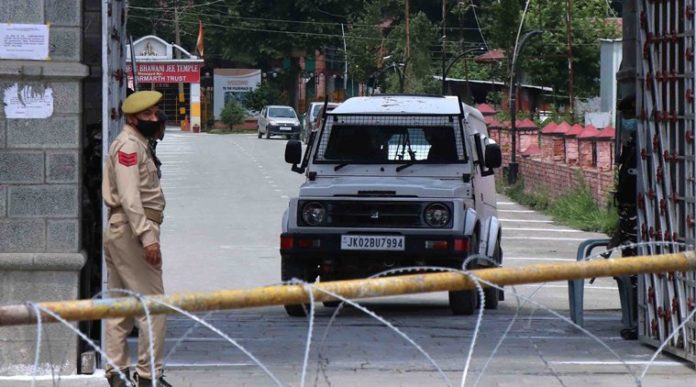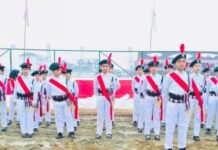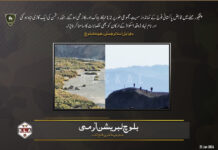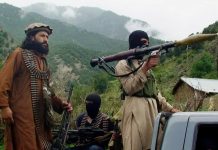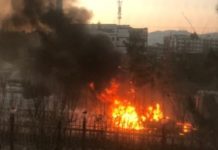Abid Bashir
Tulmulla (NVI): Tears rolled down the cheeks of Bimla, a Kashmiri Pandit woman, who had travelled all the way from Shivpora area of Srinagar to participate in the annual mela (fair) at the revered temple of Mata Kheer Bhawani in Tulmulla area of Central Kashmir’s Ganderbal district, when she saw the main entry gate of the temple closed.
“Az kya gow aese (what happened to us today). The Covid has taken away sheen off the annual mela. There is nobody present in the temple today and the entry gate is locked, this is so unfortunate as this has never happened in my life,” she said.

Every year, Bimla would reach the temple early in the morning on the eve of Mela Kheer Bhawani as she would sit among dozens of Kashmiri Pandit women, who would sing Kashmiri songs and religious verses to mark the occasion. But today, she missed everything—the aura and spirituality she would enjoy with her friends and relatives at the temple—only due to Covid-19.
The Kheer Bhawani mela—one of the important festivals of Kashmiri Pandits, is celebrated on ‘Zyestha Ashtami’, which fell today, (May 30) this year. Every year, thousands of Kashmiri Pandits visit the temple to participle in religious rituals and to pay obeisance. Even the members of the community settled outside J&K would not miss the occasion and throng in large numbers on this eve to participate in hawans (offering prayers to god or a deity in front of the fire) and other rituals.

The festival has been always a glaring example of Kashmir’s composite culture and communal harmony as Muslims would facilitate their pandit brethren by providing refreshments and by setting up stalls to sell lamps (diyas) milk, coconut, flowers and everything used in the hawan and pooja.
“There are no stalls today here. The spiritual aura is missing. Where are our Muslim brothers and sisters, who would offer us water and refreshments on this day? Oh God, what have you done to us,” said Bimla, while leaving the temple after spending 15 minutes there.
Ghulam Rasool Dar, a local resident of Tulmulla said that there were clear directions from the administration that no stall would be set up in view of the pandemic and there was prior information that no large gathering will be allowed at the temple this year.
“Setting up a stall had been just an excuse as I would meet my childhood friend Radha Krishen on this day. My heart is crying and I want to cry loudly as the pandemic didn’t allow my friend to pay obeisance at the temple this year,” Dar said amid sobs. “I greeted him over phone and both of us broke down. Covid played spoilsport in our meeting. Hope this disease fades away soon.”
A local shopkeeper Abdul Ahad said that he would put on display Kashmiri shawls, curtains, bedsheets, cushion covers and other traditional varieties at his shop. “Last year, I sold 90 per cent of the stock and the majority of my customers were my KP friends,” Ahad said.
Sameer Bhat, a Kashmiri Pandit settled in Jammu said, he has been badly missing the Kheer Bhawani Mela this year. “I was informed by the J&K Dharmath trust, the managing body of the Kheerbhawani Temple, that there won’t be mela this year due to Covid. My daughter, wife and parents insisted me to visit the Temple, I have been trying hard to persuade them that it wasn’t possible this year due to pandemic. It was after hours of discussion they pacified,” he said.
Chuni Lal Bhat, a Kashmir Pandit, who would lead the hawan at the temple every year, said that it was really unfortunate that Kheerbhawani mela wasn’t celebrated this year. “The reason was genuine but we feel deeply hurt and saddened over the development. Our hearts would purify at the temple as would meet our relatives after a long gap and also the aura where muslims would prepare refreshments and facilitate our religious rituals is soothing and quite amazing,” he said, adding that “entire KP community is in shock over cancellation of religious rituals at the temple this year due to covid.”

